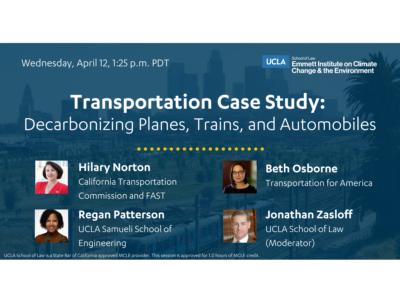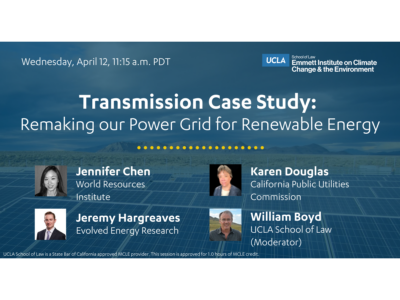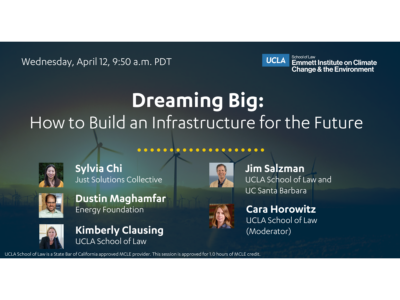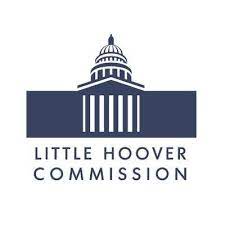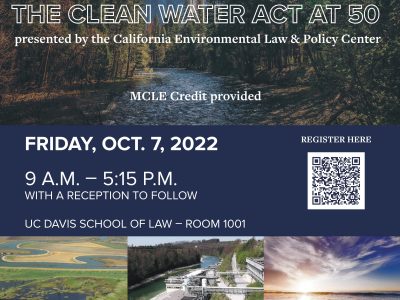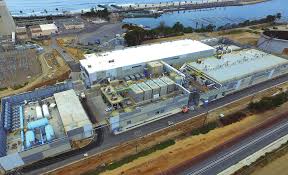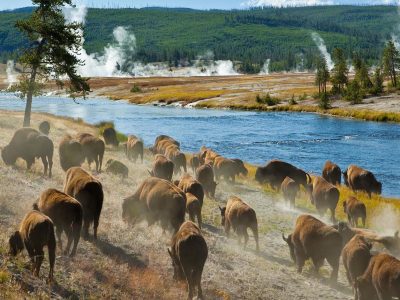Events
Can the New Climate Laws Transform our Transportation Infrastructure?
The IIJA and IRA will spend a lot of money on transportation—but whether they’ll create fundamental change in our infrastructure or continue business as usual will depend on how that money is used.
This is the last in our series of posts previewing the Emmett Institute’s 2023 Symposium, coming up on April 12. Check out the first post, introducing some of the big questions around the IIJA and IRA, the second post, on transmission infrastructure, and RSVP for the Symposium here! Transportation is one of the most complicated …
Continue reading “Can the New Climate Laws Transform our Transportation Infrastructure?”
CONTINUE READINGHow Can We Build Transmission Infrastructure Responsibly?
The IIJA and IRA offer a chance to speed up electricity-transmission development, but can it be done fairly?
This is the second of a series of posts previewing the Emmett Institute’s 2023 Symposium, coming up on April 12. Check out the first post, introducing some of the big questions around the IIJA and IRA, and the third post, on transportation infrastructure; and RSVP for the Symposium here! The clean-energy transition that is one …
Continue reading “How Can We Build Transmission Infrastructure Responsibly?”
CONTINUE READINGHow Should We Implement the New Federal Climate Laws?
An upcoming symposium by the Emmett Institute will explore the key climate impacts of IIJA and the IRA and unpack some of the obstacles and controversies around their implementation.
This is the first of a series of posts previewing the Emmett Institute’s 2023 Symposium, coming up on April 12. Check out the second post, on transmission infrastructure, and the third post, on transportation; and RSVP for the Symposium here! The Infrastructure Investment and Jobs Act of 2021 (IIJA) and the Inflation Reduction Act of …
Continue reading “How Should We Implement the New Federal Climate Laws?”
CONTINUE READINGCritical Native American Water Rights Cases Come Before the Supreme Court: Arizona v. Navajo Nation
The Navajo Nation Has the Equities on Its Side, But the U.S. Department of the Interior May Well Have the Law in Its Favor
Today the U.S. Supreme Court hears oral arguments in the last natural resources cases on its docket this Term: Arizona v. Navajo Nation and U.S. Department of the Interior v. Navajo Nation. These consolidated cases are consequential for several reasons: to determine the scope of the federal government’s trust obligations to Native American tribes; to …
CONTINUE READINGCEQA, California’s Housing Crisis & the Little Hoover Commission
State Watchdog Agency’s Scheduled CEQA Hearings Could Prompt Major Changes to California’s Most Important Environmental Law
Beginning today, California’s “Little Hoover Commission” will convene a series of three public hearings to consider how well–or poorly–the state’s California Environmental Quality Act (CEQA) is currently working. A special focus of the Commission’s deliberations will be whether and to what extent California’s most important and overarching environmental law is impeding efforts by the Legislature …
Continue reading “CEQA, California’s Housing Crisis & the Little Hoover Commission”
CONTINUE READINGA Great Victory For Electric Cars
But Beware: Neanderthal GOP Judges Are Waiting To Strike It Down
With all the attention being paid to Volodymyr Zelenskyy’s visit to Washington, and the release of the January 6th Committee, you might have missed the (second) most important environmental story of the week: The U.S. Postal Service will buy 66,000 vehicles to build one of the largest electric fleets in the nation, Biden administration officials …
Continue reading “A Great Victory For Electric Cars”
CONTINUE READINGU.C. Davis Law School to Host “Clean Water Act at 50” Conference
Interdisciplinary Event Will Assess Landmark Law’s Past, Assess Its Future
On Friday, October 7th, the California Environmental Law & Policy Center at U.C. Davis School of Law will convene a major, day-long conference to commemorate the 50th anniversary of the federal Clean Water Act. The event will assess the progress the U.S. has made over the past half-century in abating water pollution; focus on some …
Continue reading “U.C. Davis Law School to Host “Clean Water Act at 50” Conference”
CONTINUE READINGDesalination: An Essential Part of California’s Water Future
Coastal Commission’s Recent Rejection of Huntington Beach Desalination Project Misguided
Let me begin this commentary with a disclaimer: I was an early and strong proponent of Proposition 20, the successful 1972 California voter initiative measure that enacted the Coastal Act and created the California Coastal Commission (albeit temporarily). I supported with equal enthusiasm the state Legislature’s 1976 enactment of legislation making both the Coastal Act …
Continue reading “Desalination: An Essential Part of California’s Water Future”
CONTINUE READINGRegistration Is Open for the 2022 California Water Law Symposium
California’s Most Important Annual Water Law Conference–Law Student Organized!–Set for April 9th
Registration is now open for California’s 2022 Water Law Symposium, scheduled for Saturday, April 9th. U.C. Davis School of Law has the honor of hosting this year’s Symposium, which is an extraordinary event in two respects: first, it is organized entirely by law students (rather than law firms, water organizations, law professors or commercial vendors). …
Continue reading “Registration Is Open for the 2022 California Water Law Symposium”
CONTINUE READINGCelebrating the Birth of America’s National Park System
Yellowstone–the World’s First National Park–Created 150 Years Ago
American author, historian and conservationist Wallace Stegner once observed: “National parks are the best idea we ever had. Absolutely American, absolutely democratic, they reflect us at our best rather than at our worst.” More recently, Ken Burns channeled Stegner in titling Burns’ award-winning PBS documentary, “The National Parks–America’s Best Idea.” The National Park System …
Continue reading “Celebrating the Birth of America’s National Park System”
CONTINUE READING



